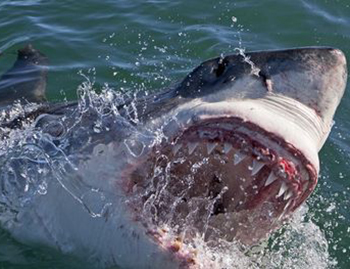Discovery’s Michael Sorensen on Shark Week’s Evolution

The smarter way to stay on top of broadcasting and cable industry. Sign up below
You are now subscribed
Your newsletter sign-up was successful
Last year was Discovery Channel VP of production and development Michael Sorensen’s first overseeing development for the network’s Shark Week-related original programming. Next week marks his second Shark Week, and the network’s 27th. This year, Discovery is premiering 13 original Shark Week specials as well as after-show Shark After Dark. Sorensen spoke with B&C about programming stunts, aftershows and living with Shark Week year-round.
How has Shark Week evolved since the beginning?
Looking back, we noticed that it started with five or six premieres in year one. There were a lot of re-packs. Back then we aired a lot of natural history programming. Sharks were a big part of it. I think they noticed that [the ratings] tended to spike every time we put sharks on the air. Over the years, it’s really evolved. It started as this really cool niche natural history thing, and now it’s become this pop-culture phenomenon. I’ve met people who’ve never, ever lived a day of their lives without Shark Week. I meet people who are 25 and they’re like, “Man, I love Shark Week. I watched it with my parents growing up.”
Marathons and network takeovers have been around a long time, but are still be popular. Nat Geo has Big Cat Week. FXX is going to do a week-long Simpsons marathon. Why is this still an effective programming tool?
I think it’s so hard to break through right now. It’s so hard to launch something new and for the audience to find it. Unless somebody they know tells them it’s cool or awesome, they don’t rush out to see it. That’s the hardest thing we have to overcome in cable, and I’m sure broadcast networks feel the same way. These programming weeks, it seems to me that the ones that are working feel a bit nostalgic. What we noticed last year, hearing about people having Shark Week parties, is that TV is still a way for people to get together. I think that’s what these stunt weeks tell you, is that people are still willing to get together and watch TV.
Is Shark Week event programming in the sense that most people are watching it live or close to live?
Absolutely. Shark Week is watched mainly live, even the stuff during the day. That’s why events work—you feel like you have to be a part of it or you’re going to miss out. If you’re not watching Shark Week, next week it’s over. That’s what people are talking about right now. You see that with Twitter. Last year it was definitely the most tweeted week for us for the entire year.
You’ll have Shark After Dark again. Why have after-shows become such a big deal?
When you get people engaged and you have a fan base on a show, all you see is that those people want more. They want more content, more episodes, more information. They want more access to the characters. We see it with Gold Rush. We see it in Fast N’ Loud. Online numbers pick up as soon as the show is over. People just watched the episode and they go right on line because they want more. After-shows are an extension. How do we keep this audience this engaged for this long?
You mentioned Discovery’s background in nature programming, which there is much less of now. Do you think Shark Week still fits the network’s identity?
Absolutely. We do a ton of great natural history shark shows. We invest a ton of money in shark conservation, shark science, new camera technology. The brand has also evolved. Back then, our highest-rated show was probably much different than Deadliest Catch. Over the years, we’ve definitely seen an evolution, and I think Shark Week has embraced that.
Do you live every week like it’s Shark Week?
We have a team of people here who make Shark Week year round. It is a year-round event. Some of these shows, like Air Jaws, it took two years to make that show. So if we’re not living every day like it’s Shark Week, we are living Shark Week every day.
The smarter way to stay on top of broadcasting and cable industry. Sign up below
Shark Week begins on the cabler Aug. 10. For a complete list of the week's festivities, click HERE.
